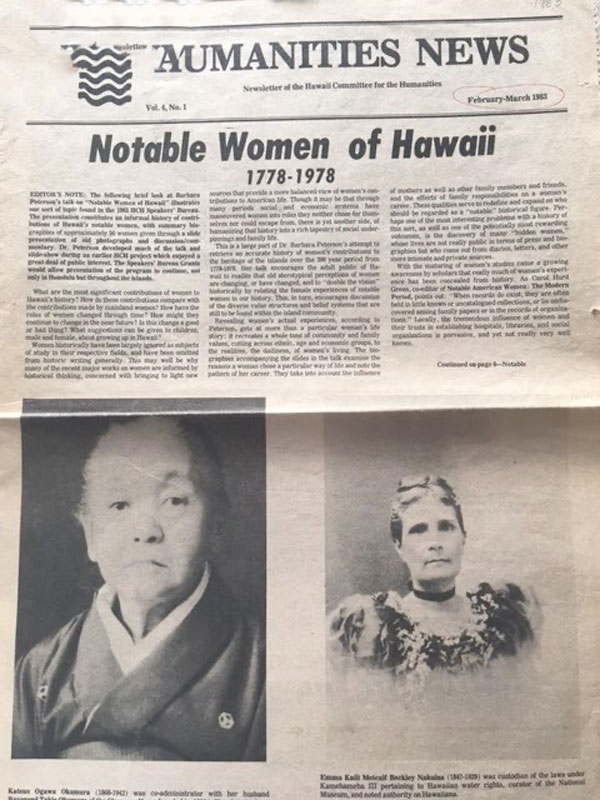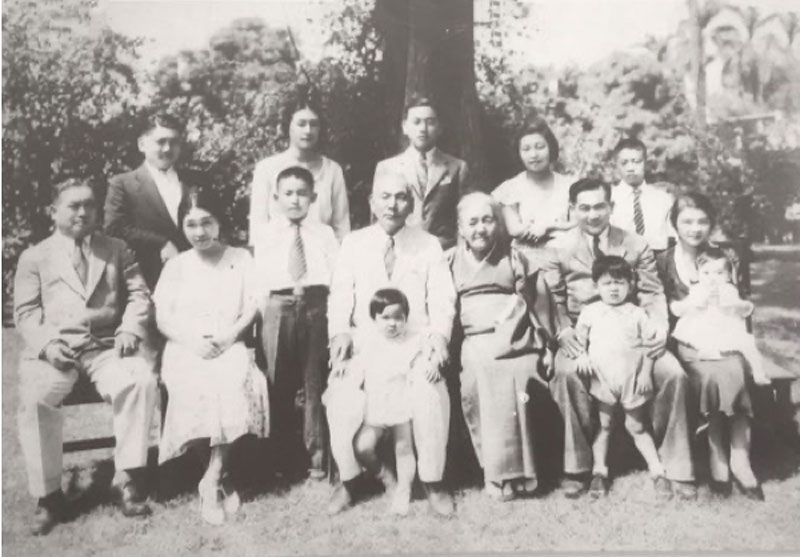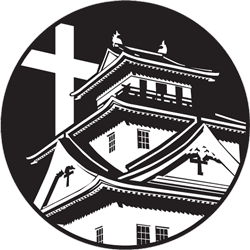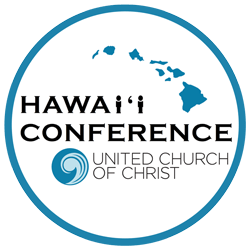Wayne Tadaki is the Coordinator at Theodore Ogoshi Archives at Makiki Christian Church. He writes a series of historical articles about Makiki Christian Church for the churchʻs newsletter.
The following factual details of this story were extracted from “Seventy Years of Divine Blessings,” “A Collection of Sermons by the Rev. Takie Okumura”, and “Humanities News, Notable Women of Hawaii”.
“Our church’s founder, Rev. Takie Okumura, was such a spirited and dynamic soldier of God! He was deeply involved in numerous community organizations and educational endeavors, while at the same time pastoring and growing his Makiki Church congregation. He let himself be guided and inspired by Jesus, and by his own fortitude and inner drive set his course squarely on God’s kingdom. But did you know that this great man was powered by a source of strength and energy even greater than himself? Letʻs learn more about one of Hawaiiʻs most notable women from 1778-1978, Mrs. Katsu Okumura.”
Early Life
Katsu Ogawa grew up the pampered daughter of a rice merchant in Osaka, Japan. With only an elementary education and slight training in light accomplishments like playing the samisen and sewing, her future prospects weren’t promising when her father died in 1886. But by January 15th of the next year, at age 21, with no practical experience in domestic affairs, she was married to Takie Okumura.
Faith Through Dire Poverty
Both young Takie and his wife Katsu came from relatively well-to-do families, but unlike his wife, Takie was highly educated. He had aspirations of becoming a politician or statesman during the politically exciting and volatile times of Japan in the 1870s and 80s. After a failed trial at politics, his relatives urged him to try his hand as an importer/exporter, but at that too, he failed. Then came civil service work, produce dealer and government contractor, all with no success. The result of these miserable failures resulted in Okumura later declaring, “I became penniless. I was completely finished and immobilized. The more I struggled to get out of the financial bind, the deeper I sank. When my second boy, Haruki, was born, we had only 13 cents left over from the previous day. I finally gave up and left everything to my wife as far as day-to-day living was concerned.”
It was at this point that his young wife, now mother of two young sons, went to work. When they married, she had brought with her a large amount of clothing and fine sets of toilet articles. One by one she brought her belongings to the pawnshop to be sold until she had only one change of clothes and one obi left to wear, and day by day the little money she received kept up the home. It was then that Okumura would say that, “For the first time, I began to appreciate my wife’s true worth.” Okumura continued, “Two years after our marriage, my mother, my wife and I, the three of us were baptized at the same time and became members of the Osaka Church. Since then the teachings of Christ exercised complete control over her (Katsu’s) life and she led a life dominated by one theme – faith. She uttered not a word of complaint, no matter how hard the going; she did not protest when subjected to insult, incivility or insolence.”
Despite the family’s dire poverty, Okumura’s prayers led him to enroll in the Doshisha Divinity School on a four-year scholarship. Okumura recalled, “During my four years in Doshisha, my wife looked after my mother and aunt and three sons with what little she earned from washing and sewing. Rev. Miyagawa, pastor of the church, often said, ‘not many have suffered so much from poverty like you and your wife, but you have weathered the severe storms remarkably well. It is truly due to your wife’s devotion and self-denial.’”
New Opportunities in Hawaiʻi
And again, almost unbelievably, Okumura decides, and recalls, “Immediately after being graduated from Doshisha, I came to Hawaii. As my contract was for only three years, I left all family matters in the care of my wife and my mother. Exactly two years since my arrival in Hawaii I made up my mind to make Hawaii my permanent home and go back to Japan to bring my wife and three children to Hawaii. Because of my sudden departure from Honolulu, I had had no time to notify my family ahead of time. They were completely taken by surprise when they received my wireless message from Yokohama. . . . Within a month and a half after leaving Honolulu, I was back again (in Hawaii) with my wife and three children.”
Helping Those in Need in Hawaiʻi
Despite what must have been certain culture shock and a totally new home environment with her three sons and newly re-aquainted husband, Katsu Okumura labored on quietly and effectively. Meanwhile, Takie Okumura’s ministry in Hawaii grew steadily and his involvement in numerous community causes and activities, including the opening of the Okumura Home for Boys and Girls, stretched his time and energy reserves thin. He naturally relied on his family, especially his wife Katsu, to carry on with much of the work needed to have these important projects succeed.
Okumura recounts Katsu’s impact on the Okumura Home operations, “As the number of boarders continued to increase, reaching an average of 70, we moved into a building on Punchbowl that had formerly housed a divinity school . . . . In running the home, the only hired help we had was a cook. Unaided by anyone, my wife attended to the details single-handed, from the preparation of the menus to the care and supervision of the children. Dressed in a plain Japanese kimono and equally plain obi, she toiled from morning till night like a housemaid, a waitress or a baby-sitter. Moreover, my wife took personal care of each child, from changing his clothes to taking care of bed wetters and cleaning up after those who accidentally moved their bowels. It was an extremely hard life by any measure.”
Okumura continues, “It was part of my routine schedule to go to one of the neighbor islands every other month and be absent from home for a week or two. Occasionally I also went on trips to Japan or the mainland (and one trip around the world). On some of these trips I was away from home anywhere from two to seven months. During these periodical or occasional absences, my wife had to bear all the attendant burdens by herself. “

Loyal and Selfless, a Servant of God
On recalling his wife’s gallant life, Okumura recounted, “Fifty years of married life – first seven of which were spent in Japan in extreme poverty. The next 43 years in Hawaii were the busiest years. But through poverty and hardships and joys my wife has stood by me loyally and unselfishly. Whatever I have been able to accomplish here in Hawaii is due to my wife’s work, unseen by others.” And during all those years of tireless toil and unremitting labor of faith, mother Katsu, or Okusan, as the boarding children called her, carried out her maternal duties in her own large family. Okumura stated that , “Of the thirteen children born to us, two were still-born, one son died of illness within a year of his birth, three sons died one after another just about the time they reached the age of maturity. The remaining seven four sons and three daughters, are still hale and hearty (in 1949).”
Lastly, Okumura recalled, “The last time she fell ill was in December, 1941. When the war broke out she started to worry about the (her two grown) children away in New York, and with so many children under her care and so many mouths to feed, she wondered constantly whether she would have enough rice and soy sauce to feed them all. These and a thousand other things worried and pained her, eventually weakening her heart. For a while her condition fluctuated, but finally on March 5, 1942 (at age 80), she passed on to her eternal sleep.”
Mother Katsu, One of the Notable Women of Hawaii 1778-1978
In the Feb-March 1983 issue of “HUMANITIES NEWS,” Newsletter of the Hawaii Committee for the Humanities, Katsu Okumura’s photo is featured in an article titled, Notable Women of Hawaii, 1778 -1978. She was included as part of a slide presentation of the history of contributions of approximately 50 of Hawaii’s notable women in the two hundred year period from 1778-1978.
Mother Katsu, the unseen and enduring power and strength behind our most venerated church founder. She labored quietly, modestly, humbly and with great faith. Mother Katsu okaasama, arigatou gozaimashita, gokurosama deshita and Happy Mothers’ Day!
The events of this story were compiled from a biography titled, “A Century of Trust, the Story of Masayuki Tokioka,” written by George Engebretson; and from several newspaper articles. These and much more can be found in the Makiki Christian Church Archives. You are welcomed to call us and arrange a visit.



